INVA HASANALIAJ
Albania has spent 91.3 million euros and 547 million ALL from 2014 to 2021 for the construction of 14 wastewater treatment plants. Despite the statistics, the Albanian coast, from north and south, continues to suffer the phenomenon of wastewater discharge pollution.
Even though the Minister Klosi has made many promises over the years that the wastewater discharge into the sea will stop, even although this practice is prohibited by law, this phenomenon is present even during the tourist season of the year 2021.
Based on site verifications carried out at the beaches of Shëngjin, Durrës, Vlora, Orikum it is clearly visible that wastewater is discharged into the sea, during the day.
Experts label them as ecological “bombs”, not only for the human health, but they also affect the flora and fauna of the coast.
The latest official report on marine water quality from the National Environment Agency shows that the main factor of pollution of coastal bathing waters, remains the discharge of untreated urban wastewater.
—
Albania has spent 47.4 million euros and 591 million ALL from 2014 to 2021 for the construction of 14 wastewater treatment plants. Despite the statistics, the Albanian coast, from north and south, continues to suffer the phenomenon of wastewater discharge pollution.

*Table data by AKUM
“The key objectives for the tourist season, safety and hygiene” was the statement of Minister of Tourism and Environment, Blendi Klosi on May 14, 2021 not long before the start of the tourist season. According to Klosi, some of the specific duties within the preparation of the tourist season should be the maintenance of security during the tourist season, cleaning the beaches and creating facilities for the movement of tourists in order to have a quiet, protected and clean tourist season.

However, within the context of the pollution of beaches, this is not the first promise that minister Klosi has made for at least the last three years. During an interview on the “Arena” show on June 13, 2018 the Minister constantly repeated that coastal cities are clean and the wastewater discharge into the sea has come to an end.
Plants in Albania, institutions give different answers
Wastewater discharge into the sea is specifically prohibited pursuant to law “On the integrated management of water resources”, specifically Article 67, but the implementation of the given legislation continues to be questioned.
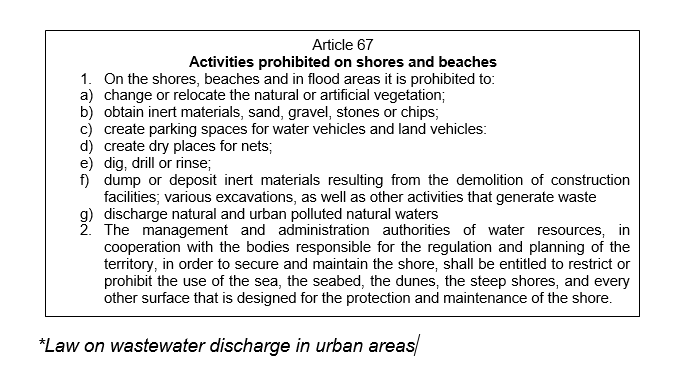
“Faktoje” sent a request for information to the Ministry of Tourism and Environment where inter alia, it was also asked about the areas that still suffer from the wastewater discharge into the sea.
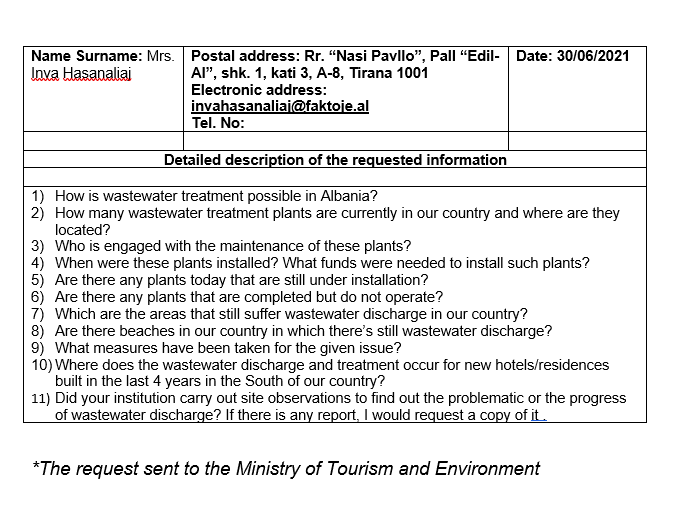
“Faktoje” has not received any official response regarding the abovementioned request.
The same request was also sent to the Ministry of Energy and Infrastructure which was the first institution that introduced us to some of the main investments for wastewater treatment plants in our country.
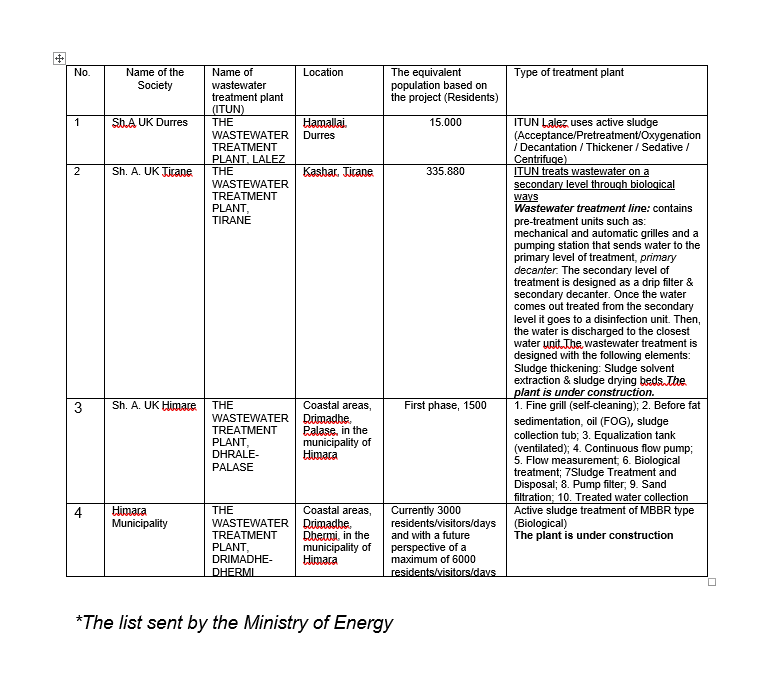
There are only four wastewater treatment plants built based on the data submitted by the given ministry, from 2014 to 2021 .
Meanwhile, another institution, the National Agency for Water Supply and Sewerage and Waste Infrastructure (AKUM) provided us with another list concerning the investments for wastewater treatment plants. The list sent by AKUM contains 14 plants and we found out that two of them are still under construction, whereas the plant of Orikum is finished, but is still expected to be connected to the wastewater system.
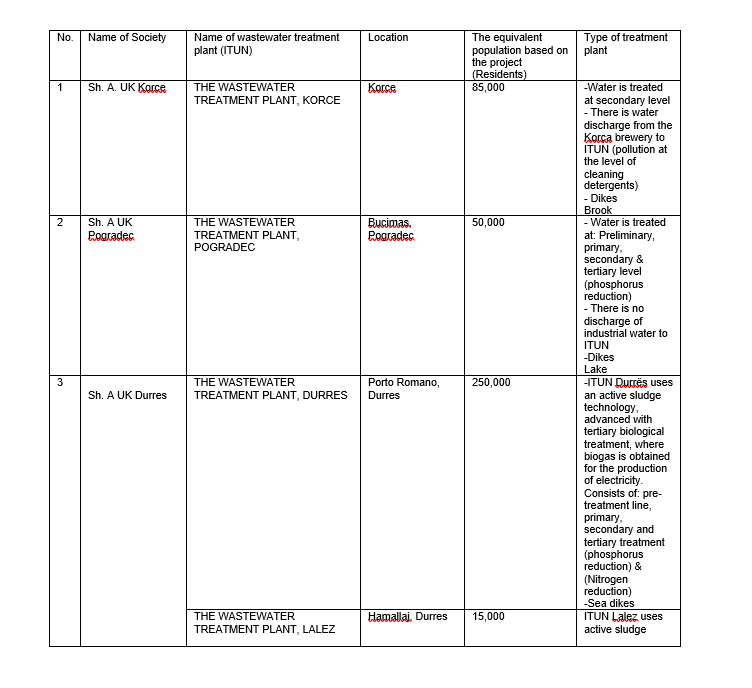
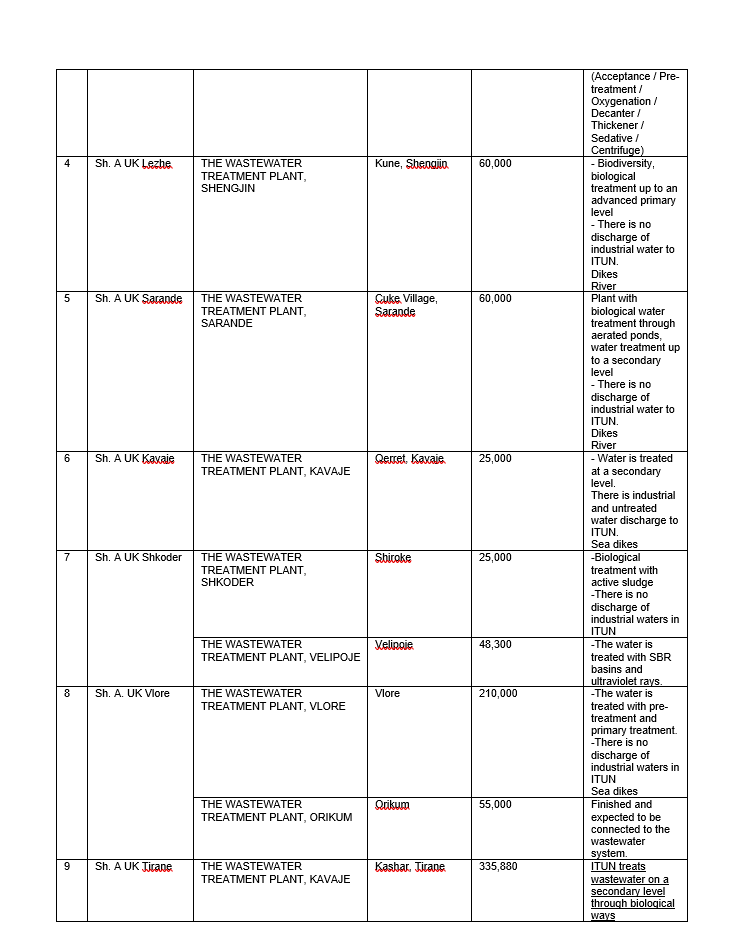
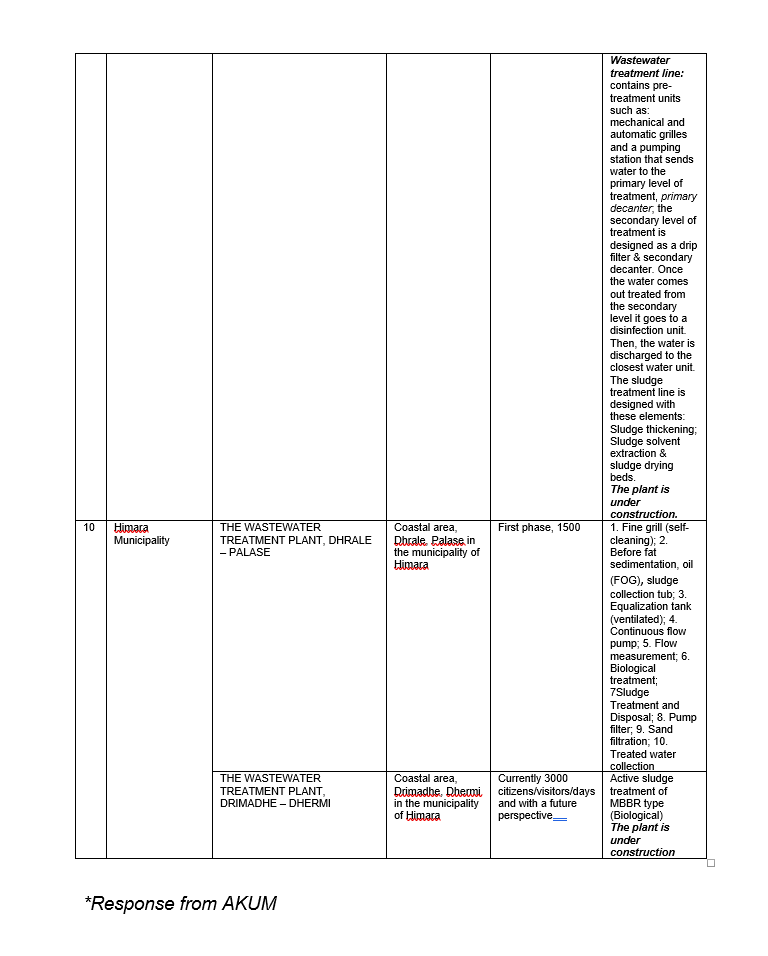
Following the responses, “Faktoje” started to carry out the site verification to find out how the situation in coastal cities is during tourist season.
Shëngjin
Although the plant in Shëngjin cost 4.9 million Euros, the wastewater discharge into the sea continues to be present. Such thing was visible in the entrance of the promenade, just a few meters far from the place where the tourists rested.

*Wastewater discharge and other plastic waste 12/07/2021
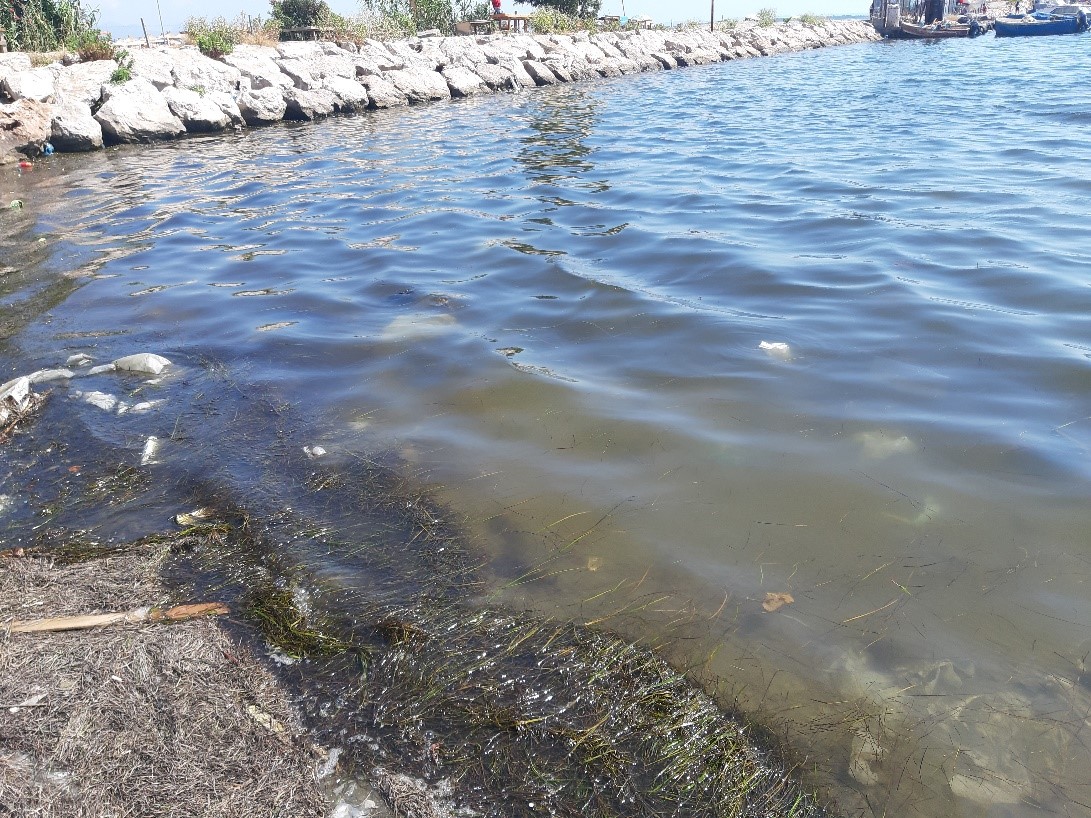
*The color of the water clearly indicates what type of waste is discharged in this area 12/07/2021
What does the municipality say?
Faktoje sent a request for information to the municipality of Lezha through which we asked the municipality if it is aware of sewage discharges on the coast of Shengjin. In its response this institution denies having sewage points.

* Response of Lezha municipality
Durrës
The largest coastal city in the country, continues to suffer the problem of wastewater discharge into the sea. In the ‘Taulantia’ promenade in Durrës, a pipe was constantly discharging wastewater very close to the area where the citizens were resting or fishing. Currently, Durres has two wastewater treatment plants in operation, one in the Hamallaj area and one in the Porto Romano area, with an investment worth 11.1 million Euros.
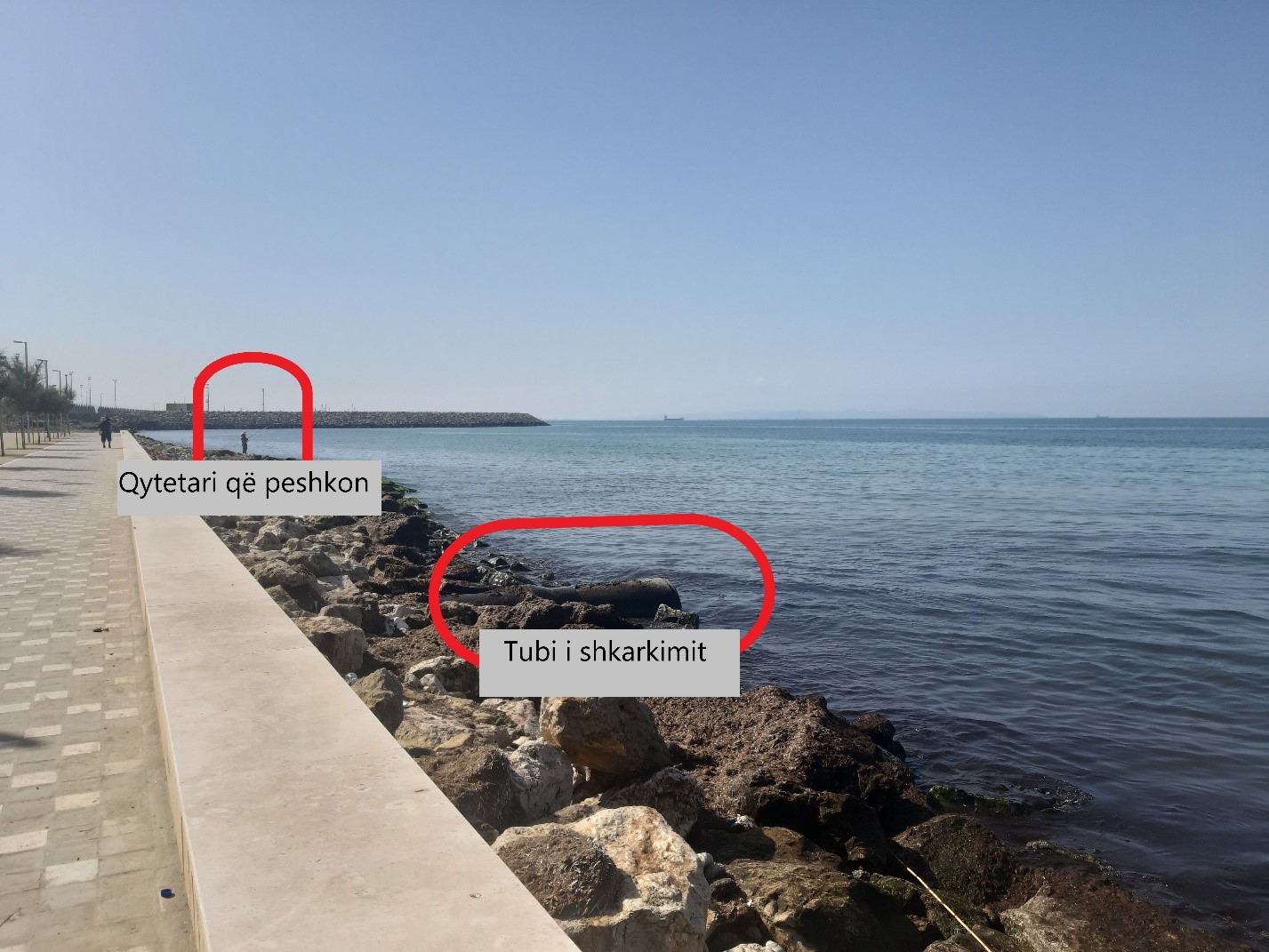
*’Taulantia’ promenade 13/07/2021
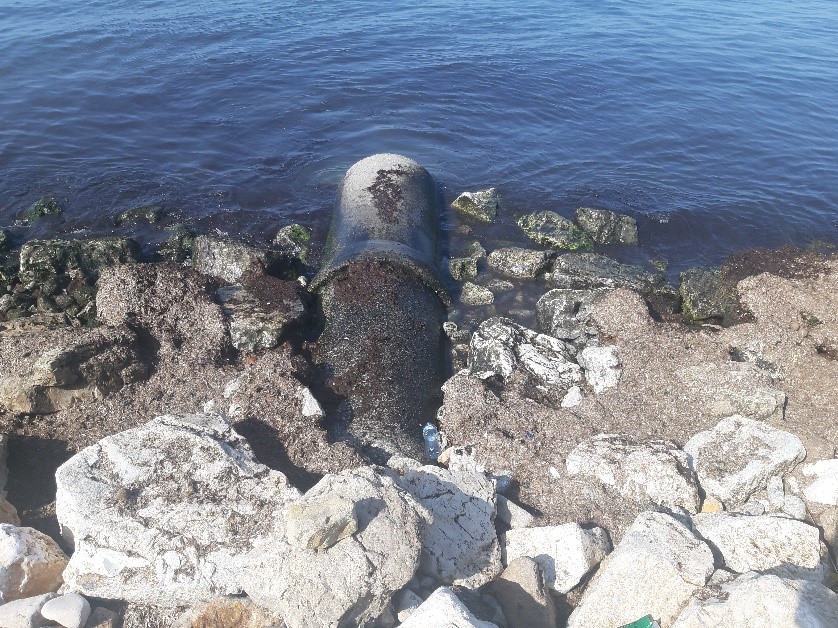
*Discharge pipe13/07/2021
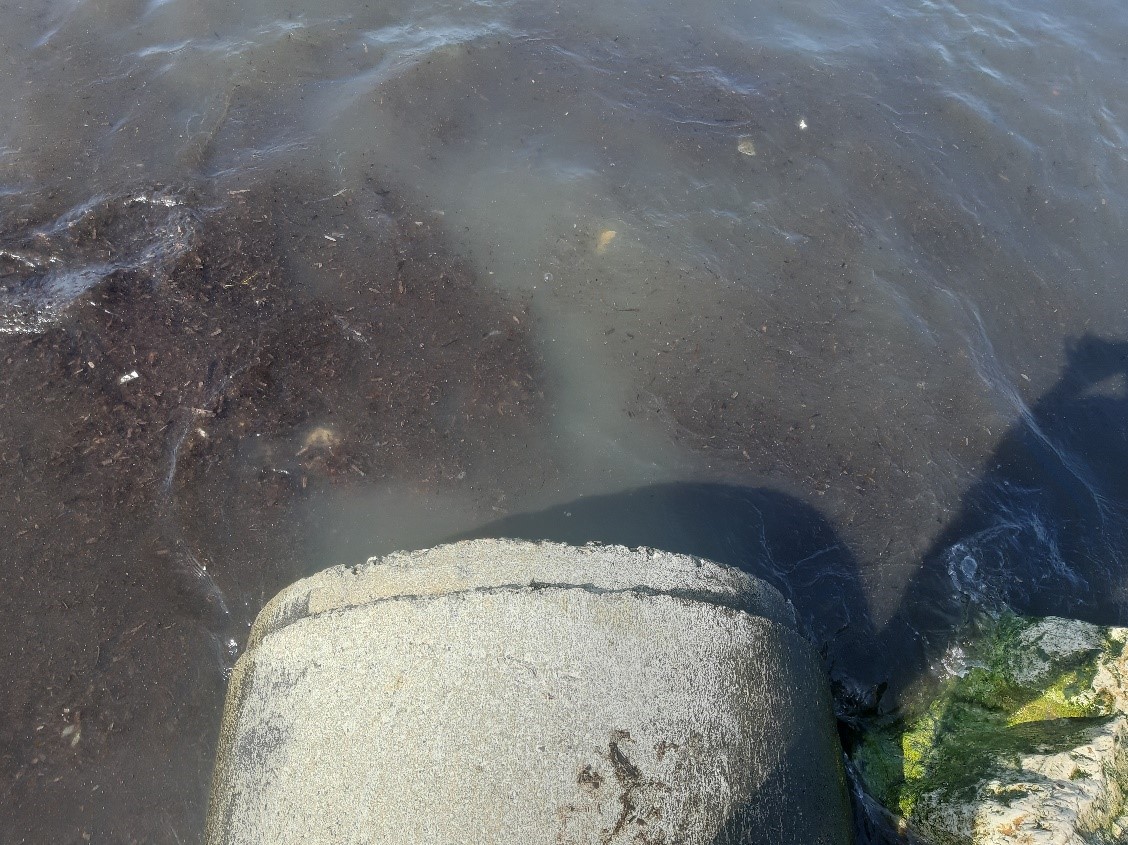
* The discharge pipe and wastewater coming out of it 13/07/2021
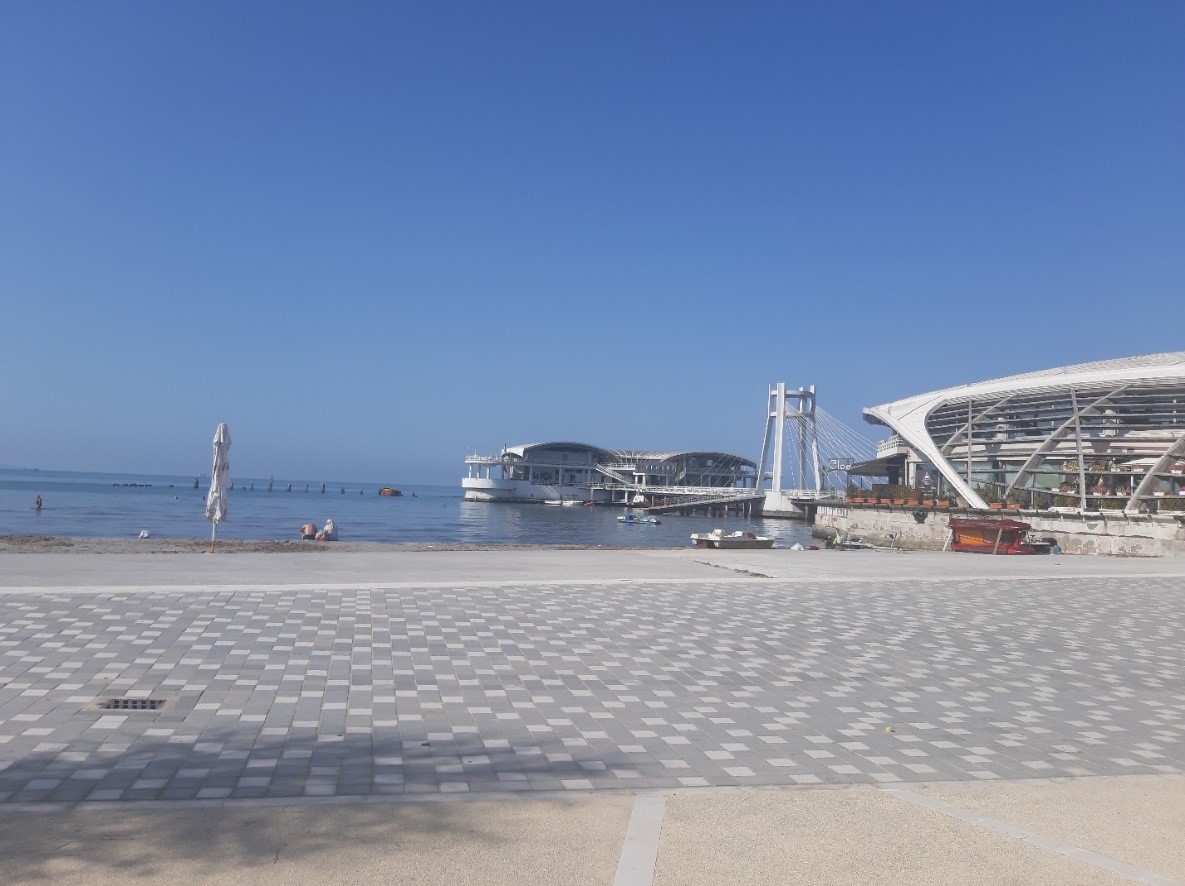
* Tourists not far from the place where the pipe is discharged 13/07/2021
What does the municipality say?
Even in the case of Durrës, Faktoje through the request for information asked the municipality if it is aware of the points of discharge of polluted water on the coast of this city, but even in this case the municipality denied having sewage discharge into the sea.
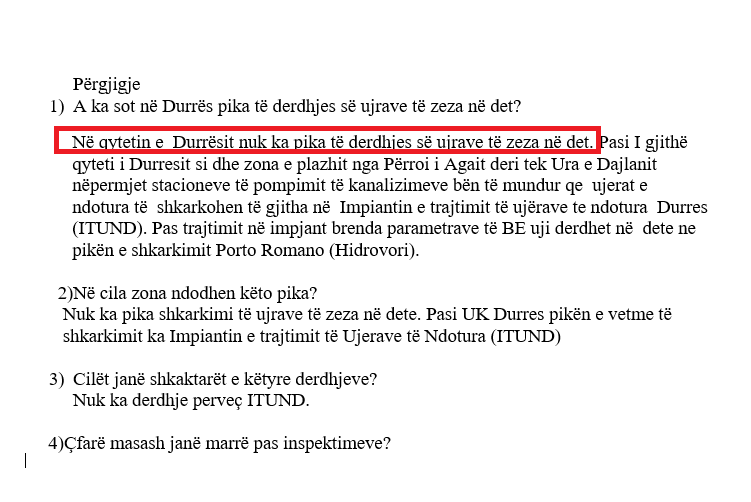
* The response of Durrës municipality
Klaudio Hyseni, the executive director of the center “Active Durres” said for “Faktoje” that wastewater discharge along the “Taulantia” promenade continues to be present for a very long time and it hasn’t received a final solution yet. According to him, some investments have been made by the Water Supply-Sewerage and Waste Infrastructure Agency of Durres, for the rainwater discharge into the sea, but this water combines with wastewater and it cannot treat untreated waters, that in normal conditions would have gone into the wastewater treatment plants.
“The given situation is an ecological bomb for the environment of the city and this affects the damage of the flora and fauna of the coast. It is a disaster, that it is still being discussed about the wastewater discharge into the sea..” – says Hyseni.
He concludes by calling on all tourists: “An advice for all tourists: You shall swim as far as possible from the pumping or wastewater discharge points.
A study of ‘Eco Albania’ on the quality of surface water in the area of the former Swamp in Durrës made in 2021, shows that the assessment made on the water quality of the system of reclamation canals in the area of the former Swamp, resulted in a “bad” quality of this waters. The report states that the results show moderate pollution of beaches in the north and south of the new hydrocarbon port in the Porto-Romano area.
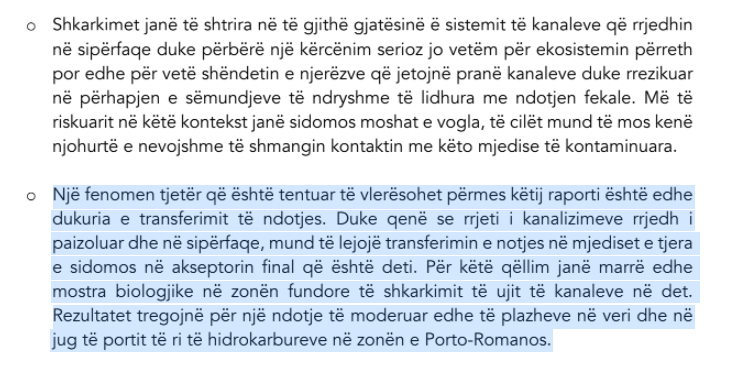
Vlorë
In the city of Vlora, the plant of 2.7 million euros is functional, based on data from AKUM, but on “Lungomare” promenade “Faktoje” found some wastewater discharge points. The citizens of Vlora state that apart from health issues, this is also something that seriously affects the tourism.
“If it wasn’t for these discharge points, it would definitely be better. We are retired and we go for walks everyday here” – said N.K 67 years old.

*Wastewater discharge point in “Lungomare” promenade 15/07/2021

*Wastewater discharge point in “Lungomare” promenade 15/07/2021

*Children swimming near the wastewater discharge point 15/07/2021
A report by the National Environment Agency on water quality in 2020 showed that the given area contains microbiological content.
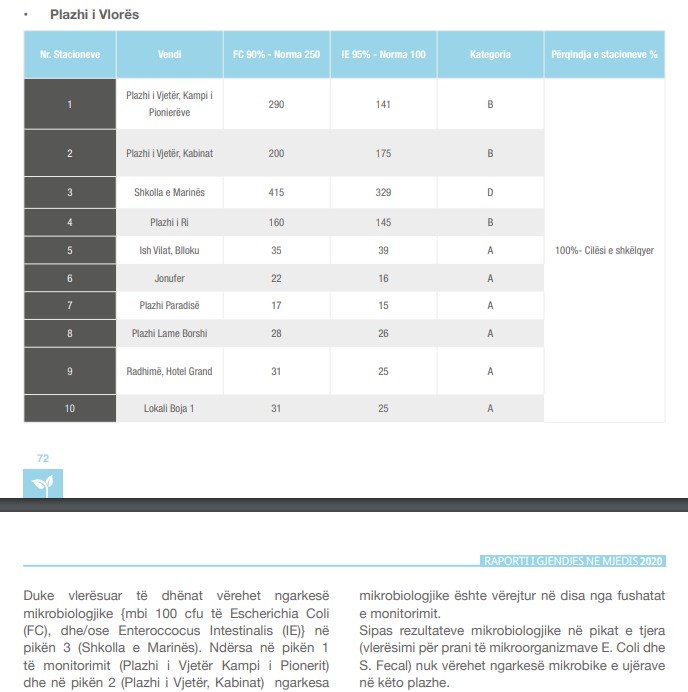
*Extract from the report of AMK for 2020
Orikum
There were 2.3 million euros spent for the construction of wastewater treatment plant in Orikum. According to AKUM and the Ministry of Energy, it is expected that the plant will be connected to the wastewater system and until that day citizens and visitors will have to come across these sights.

*Wastewater discharge point in the promenade of Orikum15/07/2021

*Wastewater discharge point in Orikum15/07/2021
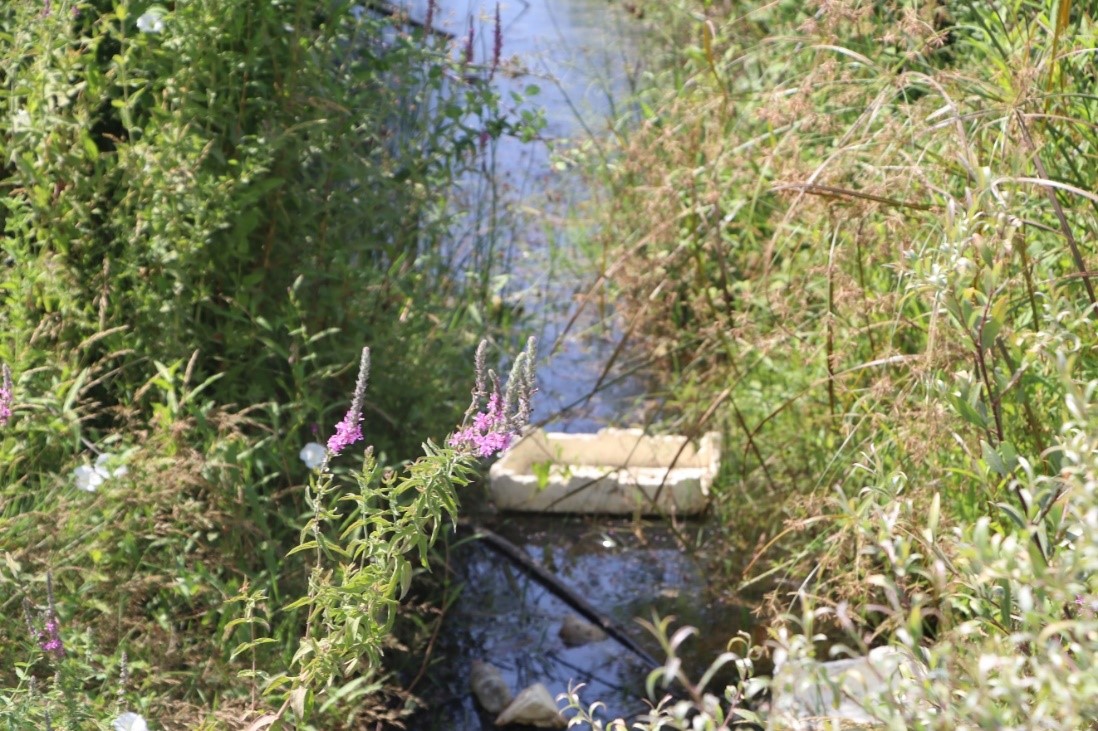
* Wastewater discharge point in Orikum 15/07/2021
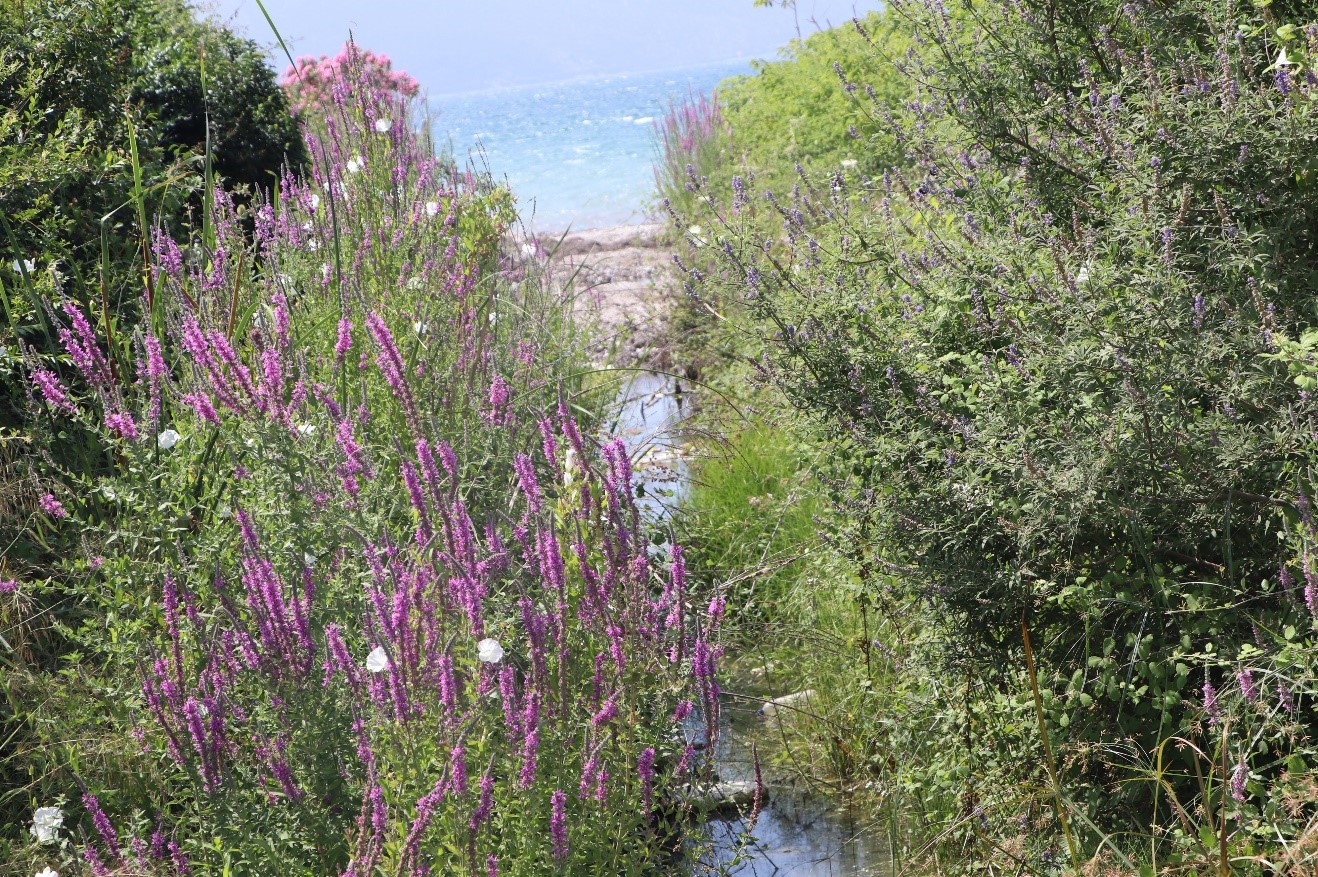
* Wastewater discharge point in Orikum 15/07/2021
PALASË
Based on the verification of Faktoje, at the beach of Palase, there is no sight of wastewater discharge into the sea. All hotels, bars and restaurants that are built in this area are currently operating with septic tanks. Even in the case of new residences and buildings that were being built, we found out that nobody knew about the plant, therefore the wastewater discharge system would operate through septic tanks.

*Construction site in the area of Palase 15/07/2021

* Construction site in the area of Palase 15/07/2021
We have no information about the plant that is expected to be built. We had no knowledge, until now, of any system that is being built that will connect the buildings with any plant” – says one of the workers at this construction site.
Based on the list sent by the National Agency for Water, Sewage and Waste Infrastructure, for the coastal area Dhrale-Palase, there is a wastewater treatment plant built, with a budget of 138.7 million ALL.
Himarë
Himara currently has only one water treatment plant in use, which has a covering capacity of 1500 citizens per day, since the middle of the tourist season and with the flow of tourists it is insufficient. Apart from this plant, the data by AKUM showed that another plant that is under construction will have a covering capacity of 3000 citizens per day. Based on the verifications of Faktoje, we could not find any wastewater discharge into the sea.

*Promenade of Himara15/07/2021
What does the municipality say?
The Municipality of Himara is the only municipality that has accepted the problem of treatment of wastewater discharged into the sea to the extent of 100%. Following the request we sent to this municipality, the Water Supply and Sewerage Service in this city informed that despite the fact that it is currently a wastewater treatment plant in the Palas area, which includes tourist villages, part of businesses and hotels do water treatment. black through septic tanks and cleaning is done individually. Also, in the same response they informed us that these systems discharge wastewater into the surrounding area.

* Response of Himara municipality
What do reports and experts say?
Regarding this issue Prof. Dr. Aleko Miho from the Department of Biology at the Faculty of Natural Sciences, UT says that if wastewater is not treated properly, then the environment and human health could be negatively affected. This could include harm to the fish and wildlife populations, decrease of oxygen, beach closure and other restrictions on recreational water use.
“Excess nutrients, such as phosphorus and nitrogen (including ammonia), can cause eutrophication, or over-fertilization of dikes which might be toxic for aquatic organisms.” – he says. According to Prof. Dr. Miho bacteria, viruses and pathogens are factors of diseases, can pollute beaches and contaminate fish populations, thus leading to restrictions on human recreation, potable water consumption and fish consumption.
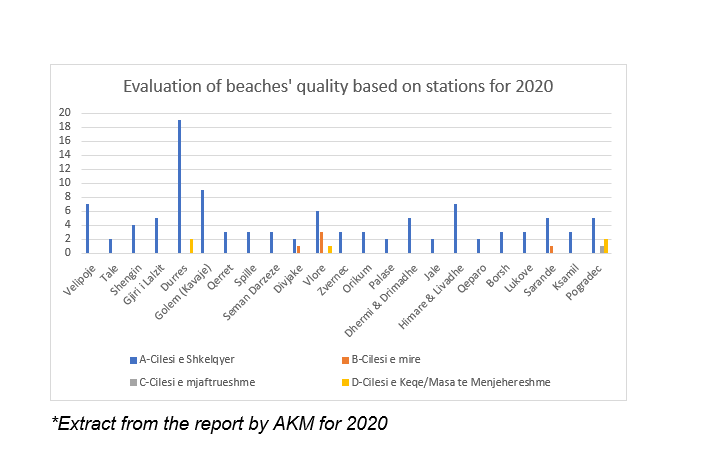
Last official report on the sea waters quality, comes from AKM in the year 2020
The latest official report on marine waters quality comes from AKM in 2020, where based on these data the main factor of pollution of coastal bathing waters, remains the discharge of untreated urban wastewater.





